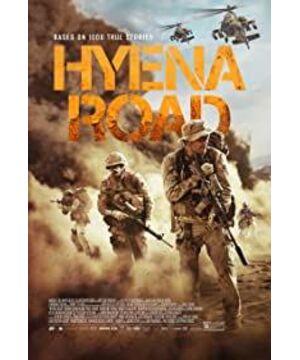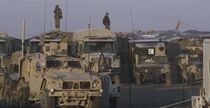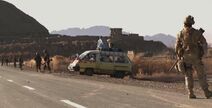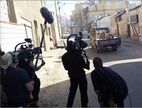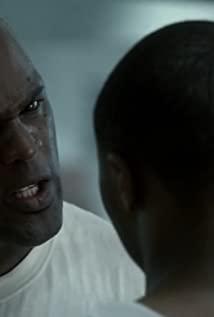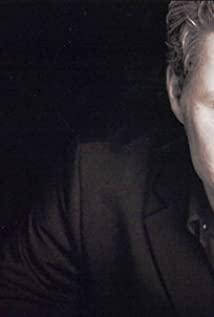I haven't watched a war movie for a long time. I recently watched a Canadian war movie "Road of the Hyena" and I recommend it to everyone. The movie is unclear even on IMDB, and the synopsis on the Chinese website is even more nonsense. The story takes place in Kandahar, the second largest city in Afghanistan, where the headquarters of the Taliban rebel group is located. After the outbreak of the war in Afghanistan, NATO troops stationed in Kandahar, and Canada, as a member of NATO, also participated. The Canadian military wants to build a highway to break through the transportation barriers in the mountains and deserts and go straight into the heart of the Taliban. This road is called the "Hyena Road". Of course the Taliban are not willing. One side wants to build roads, one side wants to destroy roads, there will be contradictions and conflicts, and the film will unfold around this conflict.
The Canadian army dispatched four-man snipers to protect the highway day and night. The main line of this movie is the three actions that the sniper leader Ryan, the male protagonist, participated in. We can divide the movie into three parts in the way that the Chinese teacher analyzes the text.
For the first time, the action was in distress on the way home. After the sniper successfully killed a terrorist who planted a landmine on the roadside, he prepared to retreat. Ryan found signs of excavation on the road. If it has been dug, it may be buried with landmines. Ryan let the sniper fire three shots at this strange place, successfully detonating the mine. Why is it three shots? Instead of solving the problem with one shot? It exploded once and there was no suspense; the second time it did not explode, the audience's hanging heart was reduced by half; the third time it exploded, it brought a strong visual and psychological impact to the audience. The third is a good number. To achieve a certain effect, the same action can be repeated three times, no more or no less. To say that there is any science in it, it seems that there is no, but the main thing is experience. We have a lot of idioms and stories about the three, such as the three punches in "Water Margin" in Guanxi, three times in Zhujiazhuang, "Three Kingdoms" in Sanguo and so on. After the bombing, the snipers were attacked by Taliban ambush. The four retreated to the village and were rescued by a mysterious man.
The second time, I searched for mysterious people. Captain Pete Michel of the command center realized that this mysterious man was an important local figure, so he took Ryan to visit the village again. This mysterious person with different eyes (brown in the left eye and dark blue in the right eye) is actually the legendary "lion of the desert." According to Peter Michel, he is the "Rommel" or "Barton" of Afghanistan. He fought the Soviet Union since he was a child, but he managed to escape the attack every time and was called the "ghost" by the Soviets. After the Soviet Union withdrew from Afghanistan, the "Ghost" announced its retirement. But for some reason, he is now back in the village. The mysterious man certainly wouldn't admit that he was a "ghost," but Pete confirmed that he was. When Ryan and his party finished visiting the "ghost" on their way back to the station, they were in danger again. The car was damaged and had to abandon it on foot, and was pursued by the Taliban all the way, before being rescued by Pete’s local informant. Why is Pete looking for this "ghost", although this paragraph does not explain, but it is obviously ulterior motive.
The third time, the opening ceremony of the road to protect the hyena. Canada’s local policy is to use puppets to resolve the confrontation between the Afghans and the Canadian army and to ensure the smooth opening of the Hyena Road. Bash Darwu Khan is their agent. However, Pete discovered that Bash Darwu Khan was in vain with the Canadian military on the one hand, and on the other hand he was fighting with the Taliban. He was behind the killing of Canadian soldiers on the Hyena Road. So Pete wanted to get rid of it quickly and looked for an agent again. Bash Darwu Khan is the local landlord. He leased the land to a farmer for planting. After the harvest, the farmer gave him five thousand dollars. However, due to the Taliban and government forces fighting on this land, the crops were destroyed, farmers failed their harvests, and they were unable to pay rent. Bash Darwu Khan quit. The farmer who rented the land is the son of the "Ghost", and the purpose of the "Ghost" coming back is to protect the family's interests. The relationship between Bash Darwu Khan and the "ghost" is also unusual. The former was once a subordinate of the latter, but he was punished by the latter for violating discipline, raped and killed Soviet pilots, and was expelled from the organization. He lost his face and held a grudge. Because the son of "Ghost" could not pay the rent of five thousand dollars, Bash Darwu Khan kidnapped the two granddaughters of "Ghost". In revenge, the "ghost" kidnapped the son of Bash Darwu Khan. There is also something worth mentioning here. Bash Darwu Khan is the two granddaughters who kidnapped the "Ghost" under the nose of Ryan's sniper team. This period of kidnapping lasted a long time, during which the little girl broke free once. It doesn't really need to be so troublesome to catch two little girls. The “ghosts” kidnapped the son of Bash Darwu Khan very quickly without encountering any obstacles. It is precisely because the kidnapping of the little girl was carried out under the nose of the sniper team, so it was obvious that the extension of the capture time was intentional. The cut shots of the two groups actually strengthened the hatred of Ryan and the group towards Bash Darwu Khan. The longer it lasts, the deeper this hatred will be. In the end, Ryan and others will not obey the command. Made a foreshadowing. The kidnapping of the son of Bash Darwu Khan was just an incident, and there was not much emotional content involved. Pete wanted to use the contradiction between the two to encourage them to participate in the opening ceremony of the Hyena Road at the same time, to set up a "two hero meeting", and let the "ghost" take action to kill Bash Darwu Khan. The third mission of Ryan and his teammates was to monitor the safety of the opening ceremony and monitor their movements. Pete only knew that Bash Darwu Khan had kidnapped the two granddaughters of "Ghost", but he didn't know that "Ghost" also kidnapped each other's son. What was more unexpected was that "Ghost" had cut off his son's head. The situation has developed to the point where Pete can't control it. The "ghost" did not follow Pete's arrangement to kill Bash Darwu Khan. After throwing his son's head, Bash Darwu Khan pulled out his pistol. The "ghost" made no resistance and prepared to die for the honor of the family. According to Canadian regulations, when terrorists endanger the safety of civilians, they can shoot directly without authorization from the chief. Therefore, even under Pete's restraint, the sniper shot and broke Bash Darwu Khan's neck. The "ghost" didn't move a finger, but the enemy died in front of him. It was indeed a lion of the desert. After hearing the news, the people of Bash Darwu Khan surrounded the snipers and trapped them in the so-called "safe house." Ryan's people were basically dead, and Ryan and the "ghost" were also dead. Severely injured, it's out of sight. In desperation, Ryan authorized the distant gunner to "fire at me" and die with the enemy. Here comes the number three again. Ryan escaped twice, and finally did not escape a third time. There is also a secondary line in the movie, which is the personal relationship between Ryan and Jane of the Intelligence Center. I think it is mainly to increase the sadness and tragic death of Ryan in the end. After watching this movie, some people said they couldn't understand it. In fact, the plot line of this movie is very clear. The Canadian military wanted to keep two important local figures in a fight in order to reverse their unfavorable situation in the construction of the Hyena Road, but accidentally sacrificed the sniper elite. If we imagined this story as a triad story, it might be more clear: a boss who thinks he can control everything, set up a bureau, wanted two bosses to kill each other, and finally lost control of the scene and broke his arm. In fact, this is how things are, it's not difficult to understand, and even a bit too simple. What did the war bring to Afghanistan? What did it bring to Canada? Ryan believed that force could save Afghanistan, and in the end he gave his life for his values, but nothing changed. This is a mockery of war. Then why is there a problem that I can’t understand? I think there may be the following three reasons. First of all, this film is permeated with a pseudo-documentary style. The camera shakes constantly during the movement to create a sense of liveness and tension in the war. But the hand-held style needs to be controlled, and after that, it will be counterproductive. Second, the transition between narrative paragraphs scans the battlefield in an unspoken MV-style editing method. This kind of transition has little to do with the story itself. If we insist on making contact, we can only say that it represents the real environment of the battlefield. Although this transition gives the audience time to breathe, it also eliminates the emotions accumulated before. Untied. In layman's terms, it is to let the audience play. Third, many dialogue shots do not use the front and back shots that we are used to. When two or more people have a conversation, the front and back are often hard cut, and this movie is about the rapid panning of the camera. This method of moving the lens quickly before finding the focus seems to imitate the movement of the human eye, but it can easily cause dizziness and cause viewing obstacles to the audience. Not only dialogue, but the same method is also used in other ways, such as shooting shots by the person here, and then quickly moving to the scene where the other person is headshot. Of course, this is just a method that the director likes to use, and I can't say how bad this method is. In fact, it seems quite enjoyable. As for your question, why doesn't the director use positive and negative editing so that at least the audience can see clearly. This is everyone's understanding of film art. Watching too many Hollywood blockbusters and domestic bad movies will lower our appreciation level. In fact, this smooth editing that pleases the audience is just one of the editing methods. It’s okay to try a different taste. It’s like you’re used to braised fish. This time it’s good to have sashimi dipped in mustard, isn’t it? Besides, it is really nothing to be able to enjoy movies like "The Mermaid". At the most it shows that you, like Stephen Chow, have the same level of knowledge as a high school education. Public number: Film pull room, welcome to subscribe.
View more about Hyena Road reviews


